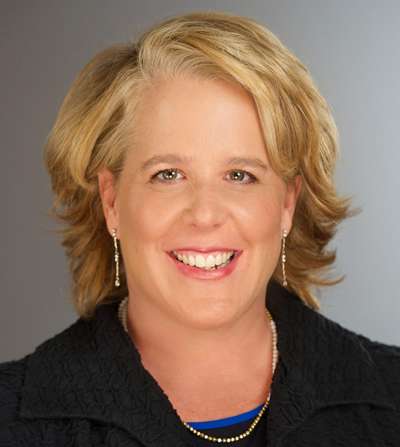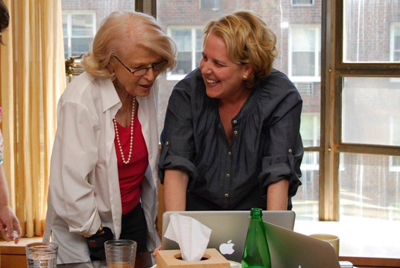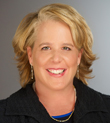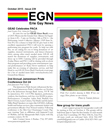Lawyer who defeated DOMA to speak at Free Library of Philadelphia
By Paige Cooperstein
paige@epgn.com

Edie Windsor, charismatic, stylish and articulate, found herself widowed just shy of her 80th birthday. She hadn't yet been married two years to her spouse, Thea Spyer, who died of complications from a heart condition on Feb. 5, 2009.
Windsor and Spyer had been together more than 40 years by the time they made the treacherous journey to Canada, soon after the case for marriage equality failed in their home state of New York. Spyer had lost the use of almost all of her limbs to multiple sclerosis and used a wheelchair.
The two married on May 22, 2007, at the Sheraton Gateway, a business hotel in Terminal 3 of the Toronto Pearson International Airport.
Roberta Kaplan, a partner at Paul, Weiss, Rifkind, Wharton & Garrison, relates the scene in her new book, "Then Comes Marriage: United States v. Windsor and the Defeat of DOMA." It came out Oct. 5.

Kaplan, also a lesbian, filed the lawsuit that ultimately resulted in the U.S. Supreme Court declaring Section 3 of the federal Defense of Marriage Act unconstitutional.
After Spyer died, Windsor inherited her estate. But because the two were a gay couple, the government did not recognize a tax exemption typically granted to married couples. Windsor had to pay $363,053 in federal taxes and $275,528 in state taxes.
"If Thea had been 'Theo' — in other words, if she had been born a man rather than a woman — then Edie, upon being widowed, would not have had to pay a single penny of estate tax on her inheritance," Kaplan writes.
As Kaplan argued her case for Windsor, a Philadelphia native who earned a bachelor's degree in psychology from Temple University, she built her strategy around one imperative, which she kept on a Post-It: "It's all about Edie, stupid."
Since the Supreme Court struck down DOMA on June 26, 2013, Windsor has earned a reputation as a cult hero. Kaplan wrote about Windsor's reception at Stonewall in New York City on the afternoon of the 5-4 decision:
"When Edie stepped out of the car, the crowd, which had packed the streets and sidewalks, went crazy. She waved her hands and blew kisses, beaming with joy as people clapped, cheered, and screamed her name."
In a phone interview with PGN, Kaplan noted, "Who wouldn't want to spend their mid-80s like Edie Windsor has? What a way to spend them."
Kaplan will be in Philadelphia at 7:30 p.m. Oct. 13 at Parkway Central Library, 1901 Vine St. She will be in conversation with Tobias Barrington Wolff, a law professor at the University of Pennsylvania. Tickets cost $7 with a student ID or $15 for general admission. They can be purchased online at www.libraryphila.tix.com/Event.aspx?EventCode=784098.
In advance of her talk, PGN got a chance to chat with Kaplan about everything from her own coming out to challenging DOMA and becoming friends with Edie Windsor. The interview transcription has been lightly edited for clarity.
PGN:
You talk a lot about how you felt like it was fate for you to take Edie Windsor's case. You sought help in your coming-out process from Thea Spyer, a psychologist, in 1991, years before meeting Edie or taking her case. It seems like it was also fate for the case against DOMA to be won at the particular time in American history when it was. Did it feel like there was something in the water around 2009 for the sea change to happen so quickly?
RK:
To use a corporate legal and a civil-rights legal term, I think a lot of the "smart money" in this area — and people who work in this field, including, of course, Mary Bonauto [Civil Rights Project director at Gay & Lesbian Advocates & Defenders] — had a sense that the next step to ultimately win equal protection under the law for gay people nationwide was to challenge DOMA. Everyone knew that the ultimate case was going to be a version of Obergefell. [The Obergefell v. Hodges decision in June essentially created marriage equality nationwide]. Ultimately, we as a community were going to ask the court to recognize and require marriage nationwide. But, before that, you have to get the Supreme Court used to the idea of gay people being married. That, in itself, was a relatively recent phenomenon. The best legal way to do that, I think everyone believed, and correctly, was to challenge DOMA, because DOMA on its face was such an irrational statute. If you think of the timeline here, marriages between gay couples only started in Massachusetts in 2003. Now, Thea died in 2009, so it's only six years later. The facts are truly incredible. When we filed Edie's case, in early 2010, only five states allowed gay couples to marry, and that didn't even include New York. When I argued the case at the Supreme Court, I think it was nine. When we won the case in June [2013], it was 13. And then it just exploded. It's easy to look back today and say, "Oh this was so obvious. Obviously this was going to happen." But in 2009, that wasn't necessarily the case. Marriage rights for gay people were still a pretty rare and pretty unique thing in this country.
PGN:
It was believed in 2013 that Justice Ruth Bader Ginsburg was against rendering a 50-state ruling establishing the right to marriage between gay couples. What do you think happened over the next two years to change Ginsburg's mind?
RK:
First of all, she wasn't that explicit, let me be clear, when she gave that interview to [Jeffrey] Toobin in The New Yorker. I think a lot of people interpreted her as meaning that she was being cautious. But she didn't come right out and say that. The reason it came out is, she was comparing the marriage issue to her theory about Roe v. Wade. Her theory about Roe v. Wade is that it arguably went too far too fast and created political backlash. I think the answer for Justice Ginsburg is probably the answer for most Americans, frankly: More and more people got — and I hate to use this phrase here, but — "gay married." So people who [Ginsburg] knew and loved — former clerks, colleagues, friends, etc. — got married. Once people get married, you see that the lives they live are no different, and the relationships they have and the marriages they have, are no different than the marriages and relationships of anyone else. In particular, I think with Edie and Thea, who were together for so long — and, in certain ways, their marriage existed over the same period as Justice Ginsburg's relationship to her late husband — I think she, like so many others, came to her standards really fundamentally about equality.
PGN:
You write in the book, "Because I was the only openly gay attorney arguing on either Perry or Windsor, I also wanted to make sure I kept my emotions as separate as I could from my argument." How did you negotiate the balance of your emotions in your argument? Did the Supreme Court justices know about your sexuality, and did opposing counsel ever try to use your sexuality as an argument against your case?
RK:
First of all, absolutely not, with respect to opposing counsel. They never raised the issue. I would've been shocked had they done so. Paul Clement and his colleagues are at the top of our profession and conducted themselves incredibly professionally and courteously throughout. So that was really never an issue. With respect to the justices, I can't tell you what the justices knew. However, if you Googled my name at that point in time, you would've been able to figure out pretty quickly that I was an open lesbian, married with a kid; or, at least, that I was a lesbian and married. With respect to the personal issues in the case, part of it was — and I believe this is true for any client — I think it's my job as a lawyer to separate out, at all times, to the greatest extent possible, whatever personal views, etc., I have about a case. Once I decide to take a case, my job is to be the advocate for my client. Whatever personal stuff I have is irrelevant and has to be treated as irrelevant. I think one of the reasons I had that Post-It, which said, "It's all about Edie, stupid," on my computer when I was working on the brief, was not only to constantly remind myself that the best way strategically to win this case was to focus on the facts of Edie and Thea's life together, but to tell myself, I think subconsciously, that I needed to keep my stuff out of it. You know, I can't be my own shrink, but I think I did a pretty good job of doing that here. I really channeled all of my energy [into it]. Let me put it to you this way, every decision we made in the case, was based on only one criteria and that was: Will doing X or Y help Edie Windsor win her case and get her money back? That was the only criteria on which we made decisions. It was the right criteria and it made making those decisions actually pretty easy. However, there were (emotional) times. For example, when I listen back now on the oral arguments, at the end there's a question where the chief justice asks me something like, "Isn't it true that politicians are falling all over themselves to support your side of the case?" When I answer him, my voice cracks a little bit. When I hear that crack in my voice, when I hear it now, to me that's kind of the Robbie Kaplan coming out. I think at that point I couldn't keep it in anymore. In retrospect, I don't think it was damaging at all, and, arguably, it was probably kind of effective. It certainly wasn't intentional. But I think for the most part, I did a pretty good job of keeping the Robbie Kaplan part of this stuff closed and shut until, of course, we won the case.
PGN:
During Mary Bonauto's early years at GLAD, gay people faced so much legalized discrimination, you write, that it seemed entirely beside the point to pursue marriage, which clearly was not going to happen anytime soon. Why do you think marriage equality ended up coming before comprehensive nondiscrimination laws at the federal level or even in many states?
RK:
I actually think this is pretty easy. Look, as I said before, marriage is hard. I'm not taking the position that anyone should or should not get married. That's a choice everyone has to make individually, and I have no issue with people who don't believe in the institution of marriage. That's fine. But if you think about how our society recognizes the commitment that a person has to another person, a lifetime commitment, that's through marriage. If you think about, what is it that distinguishes gay people from everyone else, it's the fact that they choose to have that commitment with someone of the same sex. In order for society, American society and the legal system, to truly recognize the fundamental equality of gay people, it needed to recognize their equality in marriage because marriage is how our society recognizes the essence of being gay or straight. I actually think it made total sense for marriage to happen first the way it did. Ironically, I think most people in America today think that discrimination is illegal technically even if in certain jurisdictions it may not be. But marriage, as a symbolic matter, was the necessary first step. Frankly, it was not only the first step. It's the step that's going to quickly lead to everything else that we've already seen.
PGN:
Is there anything that can be learned from Windsor and the marriage movement to help nondiscrimination laws move forward?
RK:
In Windsor and of course Obergefell, which heavily relies on Windsor, what's the fundamental holding of those cases? The fundamental holding is that gay people have the same dignity under the law as anyone else. Once you accept that proposition, I think it's very hard to justify any law that discriminates against gay people on its face. There are very few of those laws left. One of the last ones left is the one I'm currently challenging in Mississippi (which forbids gay couples from adopting children). But, coming from that position, I think it's very hard to say it's OK for a city government to fire someone because they're gay or for a shopkeeper to say to a kid, "I'm not going to sell you a chocolate ice cream cone because you have two moms." I just think that makes no sense. The country has already realized that. I think the courts are realizing it as well.
PGN:
When you first started working with Edie on challenging DOMA, many of the major LGBT-rights groups worried that it wasn't the right time to push for marriage, and they worried about making a wealthy woman the face of the movement. Did you have any qualms about Edie as the face of marriage equality?
RK:
I can answer that in a really short answer, which is: No. I thought for so many reasons that Edie was the perfect client, assuming she was willing and able. She was the perfect person to be the face of this movement. While Edie, obviously, was privileged enough to have to pay a very large tax bill to the state and federal governments, most of that was due to the fact that, like many New Yorkers, she bought an apartment in New York City in the late '70s, and like any piece of property in New York City, it greatly appreciated in value. I saw no issue with Edie's wealth. I don't even like to say wealth because, again, it's all relative. I saw no issue with challenging DOMA. There was even some disagreement among the movement people about whether it was time to bring a DOMA case. I was very much in the camp that it was absolutely the time to bring a DOMA case. I thought Edie was perfect. I think her story, her life that she lived with Thea [was perfect]. Talk about a marriage with "in sickness and in health, till death do us part." Talk about living through ups and downs with Thea's multiple sclerosis and her paralysis; the lives they both lived, even before they met, and the kind of discrimination they encountered, which seems surprising to so many people today. And then, quite frankly, it didn't hurt that she's this beautiful, charismatic, stylish, articulate woman, who is better at making these points and telling her story than anyone I can think of.
PGN: Justice Kennedy wrote, "Interference with the equal dignity of same-sex marriages was more than an incidental effect of DOMA. It was its essence." How did it feel when you read that the justices in the majority opinion so clearly understood the argument you made?
RK:
I'm trying to think of the right adjective. I mean, it was incredible. It was an incredible feeling of gratitude, an incredible feeling of satisfaction, an incredible feeling of a job well done. I think one of the things that doesn't come out enough for lawyers is — I certainly feel this way, and I think a lot of lawyers do — there's a wonderful pleasure that I get in the craftsmanship of the law; putting together and writing a brief that's complete, putting together facts, a story that's convincing, being able to persuade the judge or court that your arguments are the right arguments. Of course, when Justice Kennedy wrote this, it was kind of the epitome of that. It was the high point. It was an incredible high is the way I would put it.
PGN:
What was the process of writing the book like for you? You wrote that at the firm where you work, Paul, Weiss, legal complaints tend to be more narrative than just saying X did this and Y resulted. Did that training factor into the way you wrote the book?
RK:
I think it did. I write for a living, essentially. I spend a lot of my time writing. I love to write and I take great pride and pleasure in the craftsmanship of writing. Obviously, the way this book was written, I was able to say things that I would not say in a brief and I was able to talk about things that I obviously wouldn't talk about in a brief. But I hope it's true. I would like it to be true that if you read my voice in this book and you read my voice in my briefs, you're going to be able to realize it's the same person. That's my goal, at least. I hope I've achieved it. I take great pride in writing briefs that anyone can understand. I hope the same things are true for this book.
PGN:
What was the hardest part of the book to write?
RK:
The early stuff, for sure, about my own life. I really struggled with whether to include that. I realized, at some point, there was no way to tell this story and tell it honestly without talking about it. To write this book, I had to put down the "It's all about Edie" Post-It and explain to people the full story. It's hard. I think it's hard for anyone. It's hard writing about your past, obviously. We all do things and say things when we're young that we wish we hadn't said years from then. That was definitely the hardest part to write, and to get it right, to put it in words that I thought were honest and accurate about what had really happened.
PGN:
What was the easiest part of the book to write?
RK:
Probably the easiest, and certainly most fun part of the book to write, was the epilogue. Just to be able to kind of take from where we were in Windsor in 2013 and talk about everything that happened as a result, including Obergefell. Those words just flew out of my pen. It was a true pleasure to write that.
PGN:
Edie wrote the introduction for your book. In the early stages of her case, you wrote many letters to encourage judges to hurry the case through the litigation process because Edie was in poor health. You wanted her to live long enough to hear the final ruling in her case. How does it feel, now, knowing Edie not only lived long enough to enjoy the ruling in her case, but also became a longstanding family friend?
RK:
It's wonderful. First of all, I'll be honest, I still worry about her health all the time. That part of loving someone and caring about someone hasn't changed. We care about each other. But I said this throughout the case: The goal was making sure Edie got her money back. But the ultimate goal in the case was making sure Edie got her money back at a time when she could still enjoy it. There is no question that has happened. She so enjoys winning this case and has continued to be such a great spokesperson for our community and for the movement. On top of all that, we both have gotten this wonderful added bonus of becoming members of each other's families. Who wouldn't want to spend their mid-80s like Edie Windsor has? What a way to spend them.
PGN:
What's next for you?
RK:
I like being a lawyer. It's more that I love being a lawyer. I enjoy this type of work, the skill and craftsmanship of the law. I continue to do cases based on that. I enjoy all the cases I work on. I obviously am continuing to work in this area [LGBT rights]. We brought this pro-bono case against the Mississippi adoption ban and I very much look forward to the hearing in that case in Jackson, Miss., on Nov. 6. I think it's going to be a lot of fun. I plan to continue doing things the way I always have. If interesting cases come my way, I'm more than happy to do them. I just want to keep, for now, being a lawyer and writing briefs and arguing in courts and doing what I've been trained to do. n




